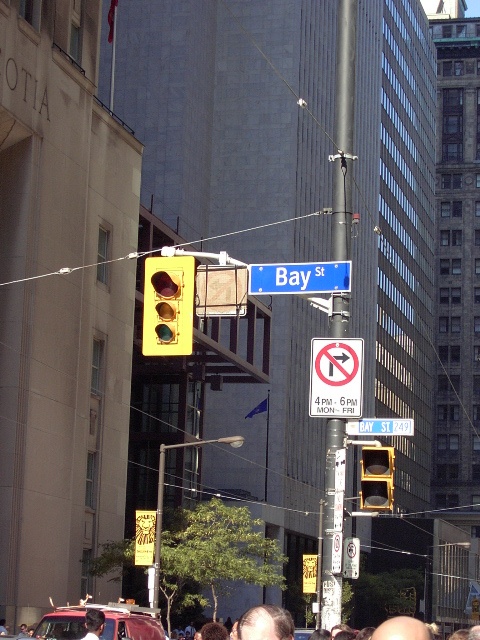The Old Blog
I used to run a Wordpress blog with random thoughts and other content; it fell by the wayside around the time I started working for UHN.
I’ve pulled some of that content over here for history purposes. This is all a decade or two old, so don’t take it too seriously.
10 Sep. 2003
you will be presented with 26 alphabet letterforms, extracted from product and corporate logos within the United States.
Your job is to figure out the source of each.
I managed to get 9 on the first test, with 5 that I should have known; 11 on the second test, with 2 more that I should have known; and 10 on the third test, with 3 more that I recognize but can’t place.
8 Sep. 2003
Soundless Music Shown to Produce Weird Sensations
British scientists have shown in a controlled experiment that the extreme bass sound known as infrasound produces a range of bizarre effects in people including anxiety, extreme sorrow and chills — supporting popular suggestions of a link between infrasound and strange sensations.
“Some scientists have suggested that this level of sound may be present at some allegedly haunted sites and so cause people to have odd sensations that they attribute to a ghost — our findings support these ideas,” said Professor Richard Wiseman.
8 Sep. 2003
Spider Robinson has a rant in today’s Globe and Mail about the dismal state of science fiction. The question:
bq. Why are our imaginations retreating from science and space, and into fantasy?
I think there are several reasons:
- Science Fiction isn’t fantastic anymore.
- Good stories are about people, not technology.
- Most of the interesting ideas have been used.
- pessimism and disillusionment.
- The distinction between “Science Fiction” and “Fantasy” has been blurring.
Good science fiction is about creating a fantastic setting (Moon colonies, space empires, unusual environments, etc.), and then writing about how people coped with, and adpated to, scenarios in those environments. Many of those stories have been done already. The relatively small leaps in tech that used to be interesting aren’t so fantastic anymore; we’re absorbing so many radical changes in our real lives, and are often unhappy about them. Modern life is about recessions, and megacorporations controlling our lives, and war in the middle east; we’re not dreaming nearly as much as we did in the heyday of Science Fiction.
5 Sep. 2003
Proving that you can do anything simply by looking official, a couple of thieves stole two mainframe computers from Sydney International Airport.
They presented themselves to the security desk as technicians sent by Electronic Data Systems, the outsourced customs computer services provider which regularly sends people to work on computers after normal office hours.
After supplying false names and signatures, they were given access to the top-security mainframe room. They knew the room’s location and no directions were needed.
3 Sep. 2003
I was driving to my friends’ house on Monday, and I noticed that all of the stores on Kennedy Road were open. This was a surprise to me; Labour Day is the mother of all statutory holidays, after all.
Apparently this was another one of those “boost Toronto’s economy after SARS and the blackout” things.
I wonder how many of the people who walked into those stores on Monday were members of a union? Oh, the irony…
31 Aug. 2003
Critters’ Journey a Lesson in Currents
Back in 1992, a violent storm tossed 20 containers of rubber duckies off the back of a cargo ship halfway between China and Seattle, and they were quickly presumed lost at sea. Instead, it appears the castaways embarked on an epic 11-year swim across three oceans and half the globe.
A couple of researchers have taken the opportunity, and are using duck sightings to update their computer models. Cool!
30 Aug. 2003
But engineers do know that nothing is perfect, including themselves. As careful and extensive as their calculations might be, engineers know that they can err — and that things can behave differently out of the laboratory.
If engineers are pessimists, managers are optimists about technology. Successful, albeit flawed missions indicated to them not a weak but a robust machine.
The constant struggle between engineering and management, in a nutshell. We see it in the software world, too, where marketing schedules and “first to market” pressures clash with our desire to create well-designed, well-coded, defect-free software.
28 Aug. 2003
From Daring Fireball: Good Times
Most corporations now have a CIO (chief information officer), whose clout is directly proportional to the number of people employed in the company’s IT division. More IT staff means a larger budget, and budgets are the rulers used to measure wangs in corporate America.
It is thus in the interests of corporate IT staff to deploy technology that requires a large IT staff for maintenance.
21 Aug. 2003
Joi Ito’s Web: Email is officially broken:
I pronounce email officially broken. If 17 percent of legit email is being blocked by spam filters, it’s not officially working.
A conclusion drawn from a single study is bad enough, but a single study done by email marketers? Surely there must be some bias in the research, and therefore the conclusions. We already know that users’ definitions of “opt-in” are often very different from marketers’ versions (The fact that I give someone my e-mail address on a registration screen does not mean I want them to declare every spammer under the sun a “carefully screened partner or affiliate”…)
17 Aug. 2003
Eric Carroll pointed out this NOAA News Online Story where they have published NOAA and AFWA (Air Force Weather Agency) images from the DMSP (Defense Meteorological Satellite Program). The difference is pretty striking:
Before:

After:

Toronto, Ottawa, Buffalo and Rochester have all clearly vanished, while Montreal continues to shine brightly…
(Image Credit: NOAA/DMSP. More are available from the NOAA page).
16 Aug. 2003
I took a few of photos before the batteries in my camera died on Thursday afternoon - mostly of people milling about outside waiting for the power to return. The patio bar outside the Toronto Dominion Center was packed.
I’m still looking for a night-time satellite photo of the area from Thursday night; I think that would look really cool, especially when compared to the normal nighttime view…






15 Aug. 2003
It has now been confirmed: the blackout was caused when a courier (or was it a security guard?) hit the EPO switch instead of the door unlock button…
(hehe)
15 Aug. 2003
So at around 16:10 Thursday afternoon, the power went off. With a couple of quick cell-phone calls we determined that the power outage was city-wide; never a good sign, because there are three relatively separate grids in Toronto. It was only once were in the car, listening to the radio, that we found out that it was most of Ontario and the north-eastern USA.
People were very well behaved. Traffic was pretty bad, but most drivers were stopping at all intersections, and many civilians were in the intersections directing traffic. It took us 1.5 hours to get home, about twice as long as usual. Lots of people ran out of gas, though; no electricity to run the pumps. Fortunately, we filled up on Monday.
13 Aug. 2003
Critical Section - The Tyranny of Email
Email is one of the greatest things the computer revolution has done for personal productivity. Used improperly, it can also hurt your productivity. This article discusses ways to use email effectively. Then it goes beyond that and talks about how to be productive, period.
A good read. When I’m concentrating, I often ignore my e-mail, and I’ve encountered incedulity from some of my coworkers.
12 Aug. 2003
Why do you have to click the Start button to shut down?
That’s when we decided to label the System button “Start”.
It says, “You dummy. Click here.” And it sent our usability numbers through the roof, because all of a sudden, people knew what to click when they wanted to do something.
The real science of usability… (laughter)
11 Aug. 2003
Top 10 Inventions in Money Technology
In an article for the upcoming DaVinci Institute Future of Money Summit, Thomas Frey lists The Top 10 Inventions in Money Technology, which are:
- The Electronic Cash Register (1906)
- Electronic Money (1918)
- The First Armored Car (1920)
- Credit Bureaus (1937)
- The Automatic Teller Machine (1939)
- The Credit Card (1950)
- Barcodes (1952)
- The Smart Card (1974)
- The Spreadsheet (1978)
- RSA Encryption (1983)
I was amused to note how long it took some of these technologies to become “mainstream” after their invention. Then I got to the conclusion of the article: